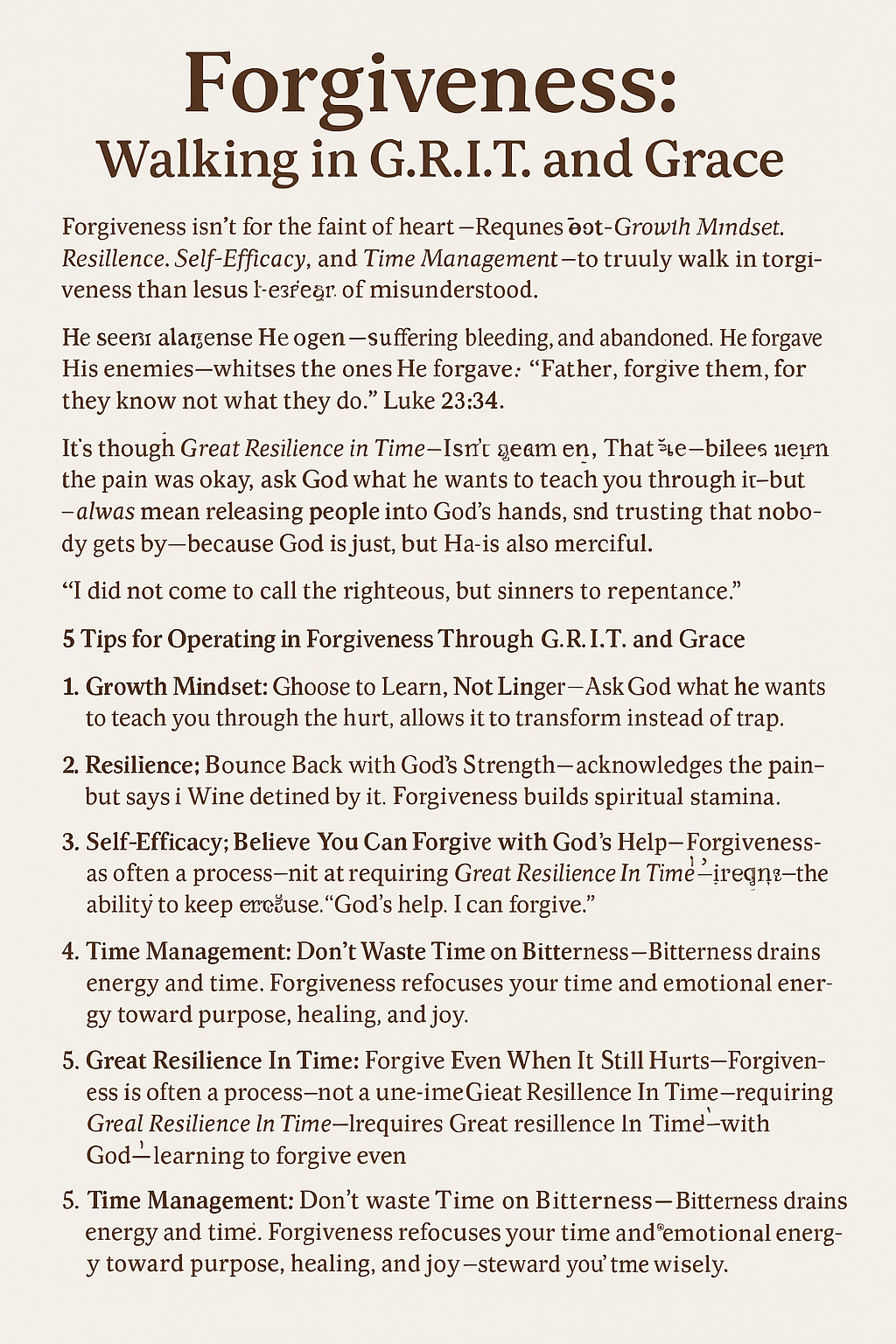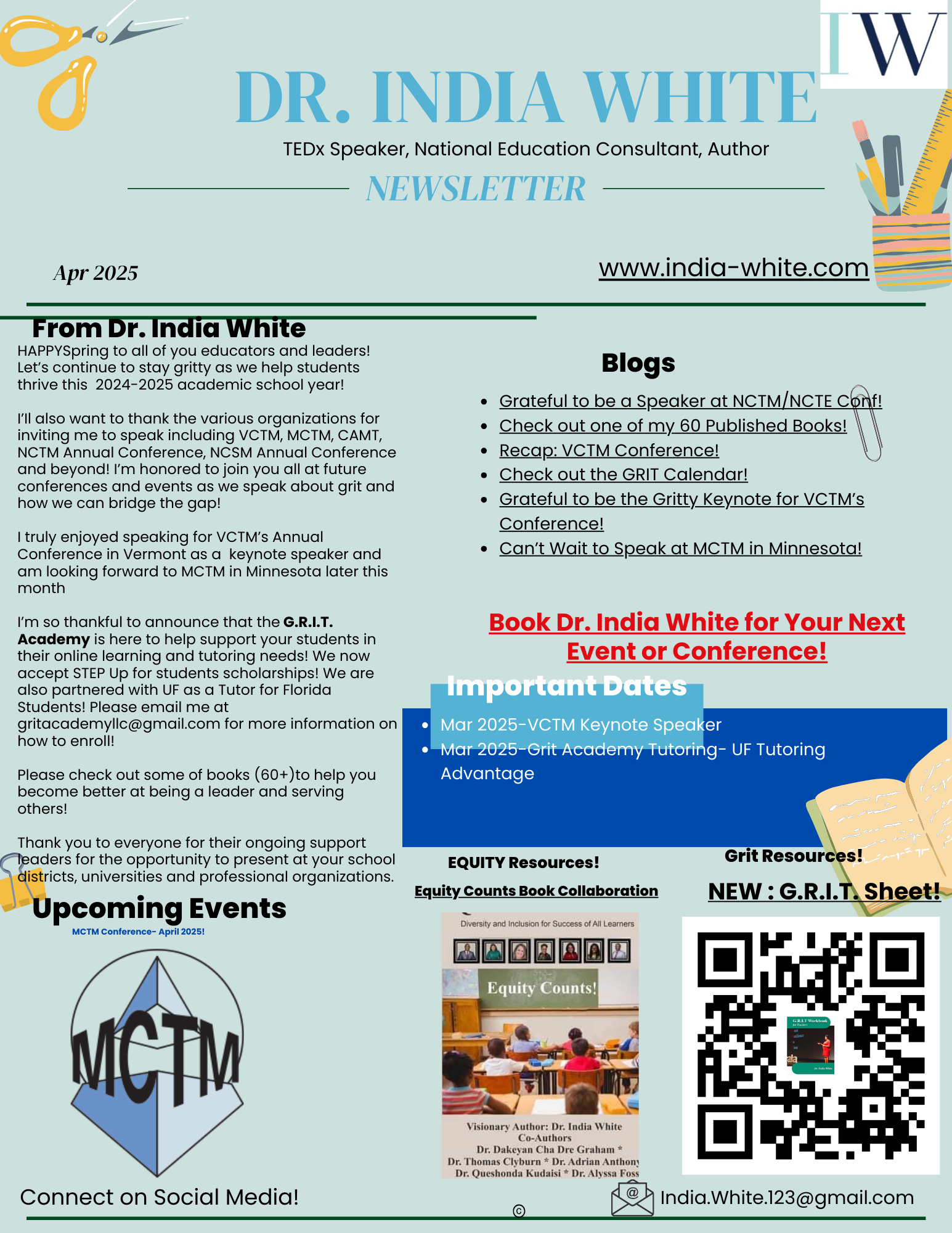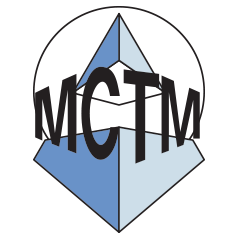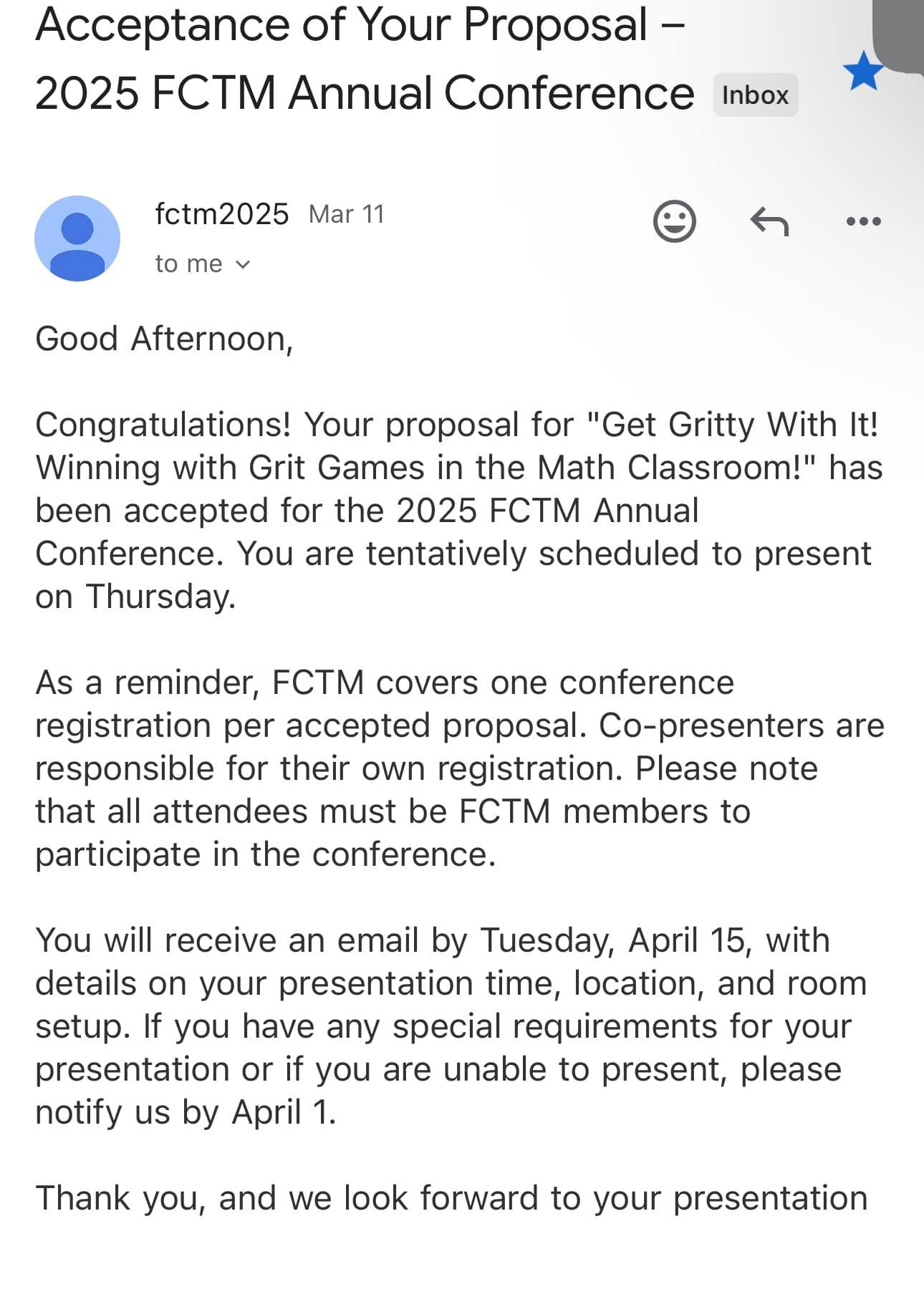Blog Layout
How Grit Framework and Grit Workbook Aligns to Florida's Resiliency Standards
India White • July 15, 2024
How G.R.I.T Framework and G.R.I.T. Workbook Align to Resiliency Standards!

How the G.R.I.T Framework and G.R.I.T. Workbook Align to Florida Resiliency Standards
Dr. India White's GREAT Resilience In Time (G.R.I.T.) Workbook for Teachers, her G.R.I.T. Framework, and her TEDx talk "The Power of Grit" align comprehensively with the Florida Health Standards and the 11 Resiliency Skills outlined in Section 1003.42(2)(n)4., Florida Statutes (F.S.). These standards emphasize essential life skills that build confidence, support mental and emotional health, and enable students to overcome challenges. Here’s a detailed explanation of this alignment:
I. Self-awareness and Self-management
Dr. White's G.R.I.T. Framework includes a self-assessment component that encourages teachers and students to reflect on their resilience, growth mindset, self-efficacy, and time management. This self-awareness is foundational for effective self-management. By understanding their strengths and areas for improvement, individuals can better regulate their emotions and behaviors, aligning with the self-awareness and self-management goals of the standards.
1) Responsible Decision-making
The G.R.I.T. Workbook provides practical exercises and scenarios that help students and teachers make thoughtful and informed decisions. By fostering a growth mindset, Dr. White emphasizes the importance of perseverance and dedication, encouraging responsible decision-making that considers long-term outcomes rather than immediate gratification.
II. Resiliency
Resiliency is a core focus of Dr. White’s G.R.I.T. resources. Her TEDx talk highlights the ability to bounce back from setbacks and maintain a positive outlook in the face of adversity. The workbook includes specific activities to build resilience, such as reflective questions and goal-setting exercises that encourage students to persist through challenges.
III. Relationship Skills and Conflict Resolution
Dr. White’s emphasis on a growth mindset and understanding diverse perspectives promotes better relationship skills and conflict resolution. By encouraging empathy and open-mindedness, her framework helps students navigate interpersonal conflicts and build stronger, more respectful relationships.
IV. Understanding and Respecting Other Viewpoints and Backgrounds
The G.R.I.T. Framework’s focus on a growth mindset also supports the understanding and respect for diverse viewpoints. Dr. White teaches that challenges and failures are opportunities for growth, which includes learning from others' experiences and perspectives.
V. Developing Leadership and Interpersonal Skills (Grades 9-12)
For high school students, Dr. White’s resources address the development of leadership, interpersonal skills, organization skills, and other critical life skills. Her workbook includes exercises on goal setting, time management, and self-efficacy, which are essential for creating resumes, exploring career pathways, and preparing for employment. These activities align with the standards' focus on preparing students for future careers and responsibilities.
VI. Florida Health Standards Alignment
Dr. White’s G.R.I.T. Framework aligns with the Florida Health Standards, specifically HE.912.R.4.1, which emphasizes the importance of character and grit in achieving successful outcomes. By teaching students to persevere, manage stress, and stay motivated, Dr. White’s resources directly support these educational goals.
VII. Alignment with 11 Resiliency Skills
Dr. India White’s G.R.I.T. Framework and Workbook are meticulously aligned with the 11 resiliency skills outlined in Florida's educational standards. Each skill is addressed through specific components of the framework, fostering comprehensive personal and professional development.
1. Grit
Dr. White’s G.R.I.T. Framework is fundamentally designed to cultivate grit, defined as the combination of passion and perseverance toward long-term goals. Through her self-assessment tools and reflective exercises, teachers and students are encouraged to identify their core passions and commit to pursuing them persistently. This focus on sustained effort and dedication, even in the face of challenges, embodies the essence of grit, helping individuals to build a strong, resilient character that is essential for success.
2. Resilience
Resilience is explicitly addressed within the resilience category of Dr. White's G.R.I.T. Framework. The workbook includes activities and questions that prompt individuals to reflect on their ability to bounce back from setbacks and adapt to change. By encouraging the practice of maintaining a positive outlook and developing strategies to overcome obstacles, Dr. White’s resources help students and teachers build resilience, ensuring they can recover from difficulties and continue moving forward with determination.
3. Perseverance
Perseverance is a recurring theme in both the growth mindset and resilience components of the G.R.I.T. Framework. Dr. White emphasizes the importance of persistence through failure and challenges, teaching that setbacks are opportunities for growth and learning. Through guided exercises, individuals are encouraged to set long-term goals, develop a plan to achieve them, and remain committed to their efforts despite difficulties. This relentless pursuit of goals is a key aspect of perseverance.
4. Gratitude
Gratitude is fostered through the self-reflection and positive outlook promoted by Dr. White's framework. The workbook encourages individuals to regularly reflect on their progress and appreciate the small victories along their journey. This practice of acknowledging and valuing positive experiences and contributions helps build a mindset of gratitude, which is crucial for maintaining a balanced and positive perspective in both personal and professional life.
5. Responsibility
Responsibility is promoted through the self-efficacy and responsible decision-making exercises within the G.R.I.T. Framework. By guiding individuals to take ownership of their actions, set realistic goals, and make informed decisions, Dr. White’s resources help foster a sense of responsibility. Teachers and students learn to be accountable for their progress and setbacks, understanding that their actions directly impact their success and well-being.
6. Responsible Decision-making
Responsible decision-making is integrated throughout the G.R.I.T. Framework, particularly in scenarios and reflective questions that challenge individuals to consider the consequences of their choices. Dr. White provides practical tools and exercises that help individuals weigh their options, think critically about potential outcomes, and make decisions that align with their long-term goals and values. This emphasis on thoughtful and informed decision-making is crucial for personal and professional growth.
7. Self-awareness
Self-awareness is central to the self-assessment component of the G.R.I.T. Framework. Dr. White encourages individuals to reflect deeply on their strengths, weaknesses, and areas for improvement. This heightened self-awareness allows individuals to understand their motivations, recognize their emotional responses, and make adjustments to their behavior that promote personal growth and effective self-management.
8. Self-management
Self-management is developed through the time management and self-efficacy activities within Dr. White’s framework. By teaching individuals how to prioritize tasks, set realistic goals, and manage their time effectively, the G.R.I.T. Workbook helps them develop the skills needed to regulate their behavior and stay focused on their objectives. These self-management skills are essential for achieving long-term success and maintaining a balanced life.
9. Mentorship
Mentorship is encouraged as part of relationship skills and supporting others within the G.R.I.T. Framework. Dr. White emphasizes the importance of building strong, supportive relationships and seeking guidance from experienced mentors. The workbook includes exercises that prompt individuals to reflect on their role as mentors and mentees, fostering a culture of support, collaboration, and mutual growth.
10. Citizenship
Citizenship is promoted through the emphasis on understanding and respecting diverse viewpoints and backgrounds. Dr. White’s framework teaches individuals to value different perspectives, fostering a sense of community and social responsibility. By encouraging empathy and open-mindedness, the G.R.I.T. Workbook helps students and teachers become active, respectful, and engaged members of their communities.
11. Honesty and Empathy
Honesty and empathy are integral to the relationship skills and conflict resolution components of the G.R.I.T. Framework. Dr. White’s resources teach individuals to communicate openly and honestly, while also understanding and respecting others’ feelings and perspectives. This focus on genuine, empathetic interactions helps build trust, resolve conflicts effectively, and foster healthy, supportive relationships.
In conclusion, Dr. India White’s G.R.I.T. Workbook for Teachers, her G.R.I.T. Framework, and her TEDx talk are meticulously aligned with Florida’s resilience standards. They provide comprehensive strategies to develop essential life skills, fostering a growth mindset and building resilience in both students and teachers, ensuring they are equipped to thrive in various aspects of life.

By India White
•
April 8, 2025
Forgiveness: Walking in G.R.I.T. and Grace Forgiveness isn't for the faint of heart. It takes G.R.I.T.—Growth Mindset, Resilience, Self-Efficacy, and Time Management—to truly walk in forgiveness, especially when you've been wronged, mistreated, or misunderstood. But there's no greater example of gritty forgiveness than Jesus Himself. As He hung on the cross—suffering, bleeding, and abandoned—He didn’t curse His enemies. He didn’t demand justice in that moment. Instead, He looked toward heaven and said: “Father, forgive them, for they know not what they do” (Luke 23:34). Let that sink in. The very people who had betrayed, mocked, beaten, and crucified Him were the ones He forgave. And He did it in real time, while the pain was still fresh. That’s Great Resilience In Time. And as followers of Christ, we’re called to do the same. We’re called to forgive those who have: • Abused us—physically, emotionally, or spiritually • Slandered us behind our backs • Taken advantage of our kindness • Lied to us, hurt us, or wronged us in ways words can’t capture Forgiveness doesn’t mean the pain was okay. It doesn’t mean you return to harmful situations. But it does mean we release people into God’s hands. We stop carrying the weight of bitterness. And we trust that nobody gets by—God is just, but He is also merciful. “I did not come to call the righteous, but sinners to repentance.” — Luke 5:32 God operates in mercy—not because people always deserve it, but because His heart is for restoration. And if we want God to operate in mercy toward us, we must be willing to pray that same mercy over those who have hurt us. Hence, I want to share with you 5 Tips for Operating in Forgiveness Through G.R.I.T. and Grace: 1. Growth Mindset: Choose to Learn, Not Linger Instead of replaying the pain, ask God what He wants to teach you through it. Every hurt can become holy ground if we allow it to transform us instead of trap us. Forgiveness is a chance to grow. Even when you find yourself lingering in the memories and wondering "What if?", choose to use the moments of hurt as an opportunity to heal and evolve into a greater version of you. 2. Resilience: Bounce Back with God’s Strength Resilience doesn’t mean you don’t feel the pain—it means you refuse to let it define you. Forgiveness builds spiritual stamina. Each time you choose grace, you build strength in your spirit. The enemy wanted that trial, setback, dissapointment to cause you to give up on God and yourself. However, you must believe that no weapon formed against you shall propser. Never allow Satan to take away your song or your purpose, no matter the weapon or vessel he chooses to attack you through. 3. Self-Efficacy: Believe You Can Forgive with God’s Help Forgiveness may feel impossible—but with God, you can do all things. Self-efficacy is about believing in your ability to move forward. Speak life over yourself: "With God’s help, I can forgive." This is not always an easy process but you can do it! Choose to speak positively about your situation. Tell God that you forgive them and take moments to think about what Jesus must have felt at the cross as he died for you. Sometimes, we are made to emulate the light of Christ so that others will have HOPE. That means we must be willing to be curicifed at thier hands for the Glory of God. However, be encouraged, for the Lord will restore you. 4. Time Management: Don’t Waste Time on Bitterness Bitterness drains energy and time. Let forgiveness help you refocus your time and emotional energy toward purpose, healing, and joy. Steward your time wisely—it’s too precious to spend in bondage. Take time for self-care. Cry it out, seek therapy, have an outlet that will help you develop and heal and mature in a healthy fashion. Understand that all of us fall short; people will most likely dissapoint you, so flow in grace. 5. Great Resilience In Time: Forgive Even When It Still Hurts Forgiveness is often a process, not a one-time event. It requires Great Resilience In Time —the ability to keep choosing grace, even when the pain is fresh. Jesus forgave while He was still on the cross. We, too, can learn to forgive even while healing. Through your forgiveness you'll find revelation that will bring your closer to your heavenly Father. Forgiveness is one of the greatest gifts you can give—to others, yes, but also to yourself. It frees your heart. It releases your soul. It makes space for God to heal what others tried to break. Jesus didn’t wait for an apology. He forgave in real time—with G.R.I.T. and grace. So today, let’s strive to do the same. Let’s live with: • A growth mindset that says, “God can use even this.” • Resilience that says, “I will not be broken.” • Self-efficacy that says, “I can do this with God.” • Time management that says, “I will not waste one more second holding a grudge.” Let’s walk in Great Resilience In Time and extend the same mercy we so desperately need. Because forgiveness isn’t weakness. It’s worship. So, wipe you tears, forgive, reset, start over, and thrive through G.R.I.T. and Grace. Love, India Want more? Visit www.india-white.com to schedule a meeting or book me for an event. Want a copy of the Grit Workbook for Clergy (Pastors) Click here!

By India White
•
April 3, 2025
### April Newsletter: A Month of Grit and Growth April is here, and it’s shaping up to be an exciting month filled with powerful opportunities to build grit, inspire educators, and impact students. From conferences to new resources, I’m thrilled to share what’s happening this month and how you can get involved. Speaking at MCTM’s Annual Math Conference in Minnesota I’m honored to present at the Minnesota Council of Teachers of Mathematics Annual Conference this month, where I’ll be diving into how to create a Gritty Thinking Classroom. In this session, we’ll explore how the G.R.I.T. framework aligns with Peter Liljedahl’s Building Thinking Classrooms, helping educators develop a culture of perseverance, resilience, and self-efficacy in their math students. If you’re attending, I’d love to connect and discuss ways to empower students through productive struggle. G.R.I.T. Workbooks and Resources The G.R.I.T. Workbook series continues to grow, providing teachers, students, and parents with practical tools to develop growth mindset, resilience, and time management. Whether you’re looking to strengthen your own grit or help students push through challenges, these workbooks offer actionable strategies to build confidence and perseverance. G.R.I.T. Online Courses and Masterclass For those looking to take a deeper dive into grit, we’re rolling out G.R.I.T. online courses and mini-workshops designed to help educators and leaders implement grit-based strategies in their schools and classrooms. Stay tuned for our Masterclass, which will provide an interactive learning experience on how to cultivate grit in both personal and professional settings. G.R.I.T. Podcast: Conversations That Inspire The G.R.I.T. Podcast continues to feature insightful conversations with educators, leaders, and changemakers who are passionate about building perseverance and resilience. Each episode offers motivation and strategies to help you stay committed to your goals and push through challenges. Be sure to tune in for inspiring discussions that fuel personal and academic growth. Stay Connected If you’re looking for more ways to engage with the G.R.I.T. movement, be sure to check out: - www.india-white.com – Explore my work, speaking engagements, and resources - www.gritacademy.us – Learn about G.R.I.T. Academy, where we help students and educators develop the skills they need to thrive This month is all about embracing grit, growth, and resilience. Whether through conferences, podcasts, or online learning, I’m excited to continue this journey with you. Let’s keep pushing forward and building a culture of perseverance together. Stay gritty and keep striving for greatness!

By India White
•
April 3, 2025
Excited to Speak at MCTM’s Annual Math Conference: Building a Gritty Thinking Classroom! I can’t wait to present at MCTM’s Annual Math Conference this April in Minnesota. This opportunity is truly special because I’ll be diving into two of my passions—grit and Building Thinking Classrooms—to help educators create Gritty Thinking Classrooms that foster resilience, problem-solving, and perseverance in students. Why Grit Matters in the Math Classroom Math is not just about numbers and equations; it’s about persistence, self-efficacy, and growth mindset. So many students struggle with productive struggle, but when we intentionally build grit, they learn how to push through challenges rather than give up. By implementing Dr. India White’s G.R.I.T. framework, we help students: - Develop a growth mindset - Build resilience in problem-solving - Strengthen self-efficacy - Improve time management and perseverance Connecting Grit with Building Thinking Classrooms Peter Liljedahl’s Building Thinking Classrooms has transformed the way we engage students in math learning. When we merge BTC structures with grit, we create an environment where students: - Tackle challenging problems head-on - Collaborate with peers to build understanding - Learn to embrace struggle as part of growth - Develop confidence in their ability to succeed In my session, we’ll explore how BTC’s 14 elements align with grit and how teachers can create a culture of perseverance in their classrooms. See You in Minnesota! If you’re attending MCTM’s Annual Math Conference, I’d love to connect. Let’s talk about how to empower students to think, struggle, and grow. Together, we can build Gritty Thinking Classrooms that transform how students learn and engage with mathematics. Let’s get gritty! See you soon in Minnesota!

By India White
•
March 25, 2025
🌟 Excited to share my VCTM recap video! 🎥 Join me as I engage with teachers during my keynote, discussing strategies to best support our 8th grade math students. Together, we can make a difference! 💪📚 Check it out and let’s keep the conversation going! #drindiawhite #nctm #ncsm #vctm #vermont #nabse #naacp #education #doe

By India White
•
March 25, 2025
Reflection on The Power of Grit Keynote to Vermont Teachers Speaking to the dedicated educators of Vermont about the Power of Grit was an inspiring and reaffirming experience. As I shared the pillars of grit—Growth Mindset, Resilience, Time Management, and Self-Efficacy—it was evident that these concepts resonated deeply with the teachers in the room. Their commitment to fostering perseverance and confidence in their students was both heartening and energizing. Throughout the keynote, I emphasized the transformative role of a growth mindset—how students who embrace challenges and see effort as a path to mastery are more likely to persist through difficulties. I could see educators nodding in agreement as they reflected on their own students' struggles and triumphs. Encouraging students to reframe failure as a learning opportunity is a crucial shift that builds not just better mathematicians, writers, and thinkers but also more resilient individuals. Resilience was another cornerstone of the discussion. I shared stories and strategies to help students push past obstacles and develop the endurance needed to navigate academic and personal challenges. The engagement in the room reaffirmed that teachers, too, are models of resilience, especially in today’s educational climate. One of the most practical elements of the keynote focused on time management—helping students (and educators) break down overwhelming tasks, set realistic goals, and prioritize effectively. The response to this section showed that time management remains a crucial skill, not only for students learning to structure their studies but also for teachers juggling multiple responsibilities. Finally, we explored the power of self-efficacy, that deep-seated belief that one’s efforts lead to success. We discussed ways to cultivate this mindset in students through intentional feedback, scaffolding, and celebrating small wins. Seeing the teachers reflect on how they could implement these strategies in their classrooms was incredibly rewarding. This keynote reaffirmed my belief that grit is not just a personal trait—it’s a culture that educators can foster in their classrooms, schools, and communities. Vermont’s educators left the session with new insights, actionable strategies, and a renewed commitment to equipping students with the perseverance and confidence needed for success. I am grateful for the opportunity to share this message, and I look forward to seeing the impact of their work in cultivating grit across the state. Thanks Vermont Rockstars. Stay gritty!

By India White
•
March 25, 2025
✨ I had a phenomenal time speaking for the VCTM Rockstars in Vermont! We dove into how to reach all learners and stay motivated through grit. 💪 I can't wait to see the results from the grit assessment and framework! Stay gritty, y’all! 🌟 #drindiawhite #vctm #vermont #grit #educators #math

By India White
•
March 18, 2025
🌟 Super excited to announce that I’ll be the keynote speaker at the VCTM Annual Conference in beautiful Vermont! 🎉 Huge thanks to the amazing VCTM rockstars for this incredible opportunity! Let’s dive into the power of grit together! 💪✨ I can’t wait to share insights and connect with fellow educators, students, and math enthusiasts. Join us by registering below: https://vctm.wildapricot.org/event-5950535 Let’s make this an unforgettable experience! #drindiawhite #grit #tedx #vctm #teachers #students #math (I don’t own music copyright)

By India White
•
March 18, 2025
Join us on the Let's Get Gritty Podcast with Dr. India White, featuring special guest Heidi Diercks, a retired educator, and life coach! Check out Heidi's coaching nuggets here :chrome-extension://efaidnbmnnnibpcajpcglclefindmkaj/https://mail.google.com/mail/u/0?ui=2&ik=89c50e1d3a&attid=0.1&permmsgid=msg-f:1826500568311074330&th=19590896f43b0e1a&view=att&zw&disp=inline&acrobatPromotionSource=GmailNativeViewer Watch on Spotify: https://creators.spotify.com/.../Lets-Get-Gritty-Podcast... #drindiawhite #grit #tedx #lifecoach #education

By India White
•
March 18, 2025
🌟 Super grateful to announce that I’ve been selected to speak at FCTM this year! 🎉 Let’s dive into the topic of grit and its importance in education! 💪✨ Be sure to register by visiting their website. A huge thank you to the FCTM leaders for this incredible opportunity! 🙌 #DrIndiaWhite #Grit #TEDx #Math #Educators #Teachers #Students #FCTM #NCTM #NCSM
Contact Us
Thank you for contacting us.
We will get back to you as soon as possible.
We will get back to you as soon as possible.
Oops, there was an error sending your message.
Please try again later.
Please try again later.
© 2025
India White, All Rights Reserved. Powered By Automation Links
Terms of Us | Privacy Policy | About
